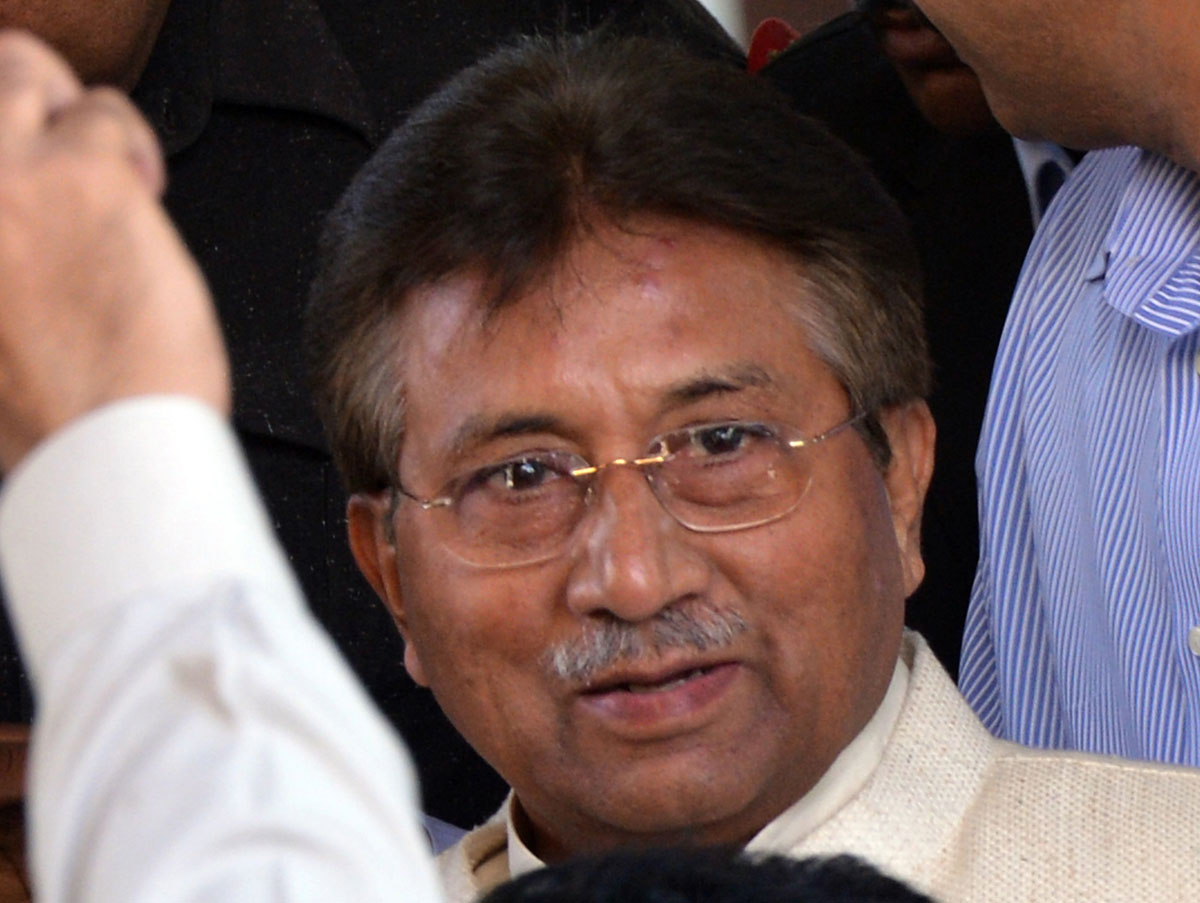Musharraf Calls Himself ‘Biggest Supporter’ of LeT
File photo of former Pakistani president Pervez Musharraf as he leaves the Pindi High Court after a hearing in Rawalpindi on April 17, 2013. A Pakistani court on April 17 extended the bail of former military ruler Pervez Musharraf in the case of 2007 assassination of Benazir Bhutto. Musharraf was granted bail last month in three cases involving charges of murdering former Prime Minister Benazir Bhutto, a rebel Baluch leader and putting Judges under house arrest. (Aamir Qureshi/AFP/Getty Images)
Calling himself the “biggest supporter” of the LeT and its founder Hafiz Saeed, Pakistan’s former dictator Parvez Musharraf, who was the brain behind the 1999 Kargil conflict, has said, Nov. 29, he backs the terror groups’ role in “suppressing” the Indian Army in Kashmir, writes Sajjad Hussain.
“The Lashkar-e-Taiba (LeT) and the Jamaat-ud Dawa (JuD) are fond of me,” said Musharraf, the 74-year-old retired general who plotted the Kargil conflict, then toppled prime minister Nawaz Sharif and ruled over Pakistan for nine years.
Musharraf, who is on self-exile in Dubai, said the Mumbai attack mastermind Saeed “is involved in Kashmir” and he supports his involvement.
When asked if he “liked” JuD chief Saeed too, Musharraf said, “Yes and I have met with him.”
“Because I have always been in favor of an action in Kashmir and I have always been favoring for pressuring the Indian Army in Kashmir. This (LeT) is the biggest force and they have been declared terrorists by India along with the U.S.,” Musharraf stressed while explaining his stance.
“India got them declared as terrorists after partnering with the U.S. Yes, they (LeT) are involved in Kashmir but in Kashmir it is between us and India,” he told the ARY News during an interview related to his 23-party grand alliance.
The JuD is believed to be the front organization for the banned LeT which is responsible for carrying out the Mumbai terror attacks in 2008 that left 166 people dead.
Musharraf categorically denied that LeT was involved in the Mumbai terror attacks for which India blamed Pakistan.
The LeT was banned in Pakistan months after the 9/11 attacks on the U.S. and the decision to ban the terror outfit was taken by the Musharraf government.
When asked about it, Musharraf said he had banned the LeT under “different circumstances.” He did not elaborate.
Musharraf’s comments came days after Saeed walked free following Pakistan government’s decision against detaining him further. He was under house arrest since January this year.
India had expressed outrage over the decision of the judicial board to release Saeed, calling it an attempt by Pakistan to mainstream proscribed terrorists and a reflection of its continuing support to non-state actors.
Saeed, who is accused of having masterminded the November 2008 Mumbai attack, was placed on the terrorism black list by the United Nations in December 2008.
The U.S. too has designated him as a global terrorist and has announced a reward of $10 Million for information leading to his arrest and conviction.

When asked about the official U.S. statement on Saeed, he said the statement was written in a highly offensive language and termed it an “insult to Pakistan’s sovereignty.”
On Nov. 24, the White House said there would be repercussions for U.S.-Pakistan relations unless Islamabad took action to detain and charge the JuD chief for masterminding the Mumbai attacks.
The U.S. had asked Pakistan to rearrest Saeed, who has been designated a terrorist by the U.S. Justice Department.
“This language is offensive and insults Pakistan s sovereignty I would never accept this,” Musharraf said.
“I would have told them,” he continued, “Please do not dictate to us. We are in-charge here. We will decide on who is the head of [and] whether he has to be tried or punished.”
When asked about his alliance with religious parties such as Majlis-e-Wahdatul Muslimeen, Sunni Ittehad Council, Pakistan Sunni Tehreek among others, Musharraf responded that such an alliance “is the requirement of the day.”
“You are describing me as a liberal. Yes, I am. These are my thoughts. This does not mean I am against all religious parties,” the former president told the anchor.
He overruled the possibility of any martial law in Pakistan, saying democracy in the country is not under threat.
Musharraf, who is facing a slew of court cases, claimed that he was ready to face all charges as the courts are not under “Nawaz Sharif’s control anymore.”


